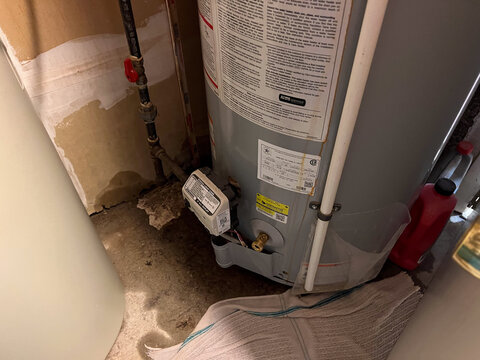
A broken water heater can deprive your home of hot water for critical tasks and activities. If the problem happens in the middle of winter, it can even be life-threatening, says Cardinal Point Management team. How quickly you deal with a broken water heater determines how badly the problem impacts your household. How should you tackle a broken water heater in your home?
Tips for dealing with a broken water heater
Turn off the water supply
The first step to minimize the damage caused by the broken water heater is to turn off the cold water supply. As long as water flows into the water heater, it will not stop discharging water into your home. To stop the water supply, find the cold water line at the top of the water heater and turn the valve clockwise – until it is 90 degrees from the open position. If you can’t find the valve or it is stuck, shut off your home’s main water supply line.
Turn off the power
Do not leave the water heater on – the heating element could overheat. If that happens, your water heater will suffer worse damage, and you may expose your home to the risk of fire. Locate the breaker box, find the breaker that controls your water heater, and turn it off. If you have a gas-powered unit, turn the valve on the gas line to shut off the gas. If you smell gas inside your home, you could have a gas leak. Call the gas company if you don’t know how to turn the gas off.
Drain the water heater
This step will get rid of any water inside the tank. To drain the water heater, attach a hose to the drain valve at the bottom of the tank. Run the other end of the hose to a location on your property where you can safely discharge the water. After opening the TPR valve to relieve the pressure inside the tank, open the drain valve at the bottom of the water heater. Let it drain until the tank is empty. If it won’t cause flooding inside your home, open the cold water supply to flush the tank.
Call your insurance company if necessary
If your home has suffered a lot of damage, you may want to call your insurance company. Even if you don’t think the damage is serious, you should still call your insurer. When speaking with the insurance company, do not try to provide full details about the cause of the problem and the extent of the damage. Those can be determined later. Meanwhile, take photos/videos of the scene so you can have records of any major damage to your home or personal belongings.
Call a plumber and water damage restoration company
Contact an emergency plumber as soon as you turn off the water supply to the water heater. Unlike regular plumbers, emergency plumbers are specifically set up to deal with plumbing emergencies. With an emergency plumber, you have a shorter wait time and 247 availability. The plumber will also arrive at your home with most of the necessary tools/supplies to fix the problem. If the emergency plumber offers water damage restoration, great!
Start cleaning up
While waiting for the plumber, move all damaged or wet items from the area of the incident. Salvageable items should be taken outside or to a part of your home where they can dry out. To remove water that has pooled on the floor of your home, use a wet/dry vacuum. If this is not possible, scoop water into a bucket using a dustpan. Towels, rags, and other absorbent materials come in handy for drying the area; get as many as you can.
Fix your water heater
The more time it takes to find and fix the problems with your water heater, the longer your home will be without hot water. Your plumber can troubleshoot the water heater to find the cause of the emergency. If you are lucky, you will not have to replace the water heater. But if the water heater tank is damaged, you may have to get another water heater. Whether you repair or replace the water heater, you want to avoid future emergencies like this one.
Maintain your water heater properly
The key to preventing water heater emergencies in your home is good maintenance. You can maintain the water heater reactively or proactively. The first option means you wait until the appliance malfunctions before you fix it. Proactive maintenance, on the other hand, means you take steps to find the problems with the appliance before they become serious. This involves having a program of monthly, quarterly, and yearly water heater inspections, as well as a plan for fixing problems as soon as they are found.
The final element in your water heater maintenance plan is a licensed and experienced plumber. A good plumber will help you save money by detecting and addressing the issues in your water heater that impair its performance and directly or indirectly cost you money.

